Mount Sinai Robert F. Smith Mobile Prostate Cancer Screening
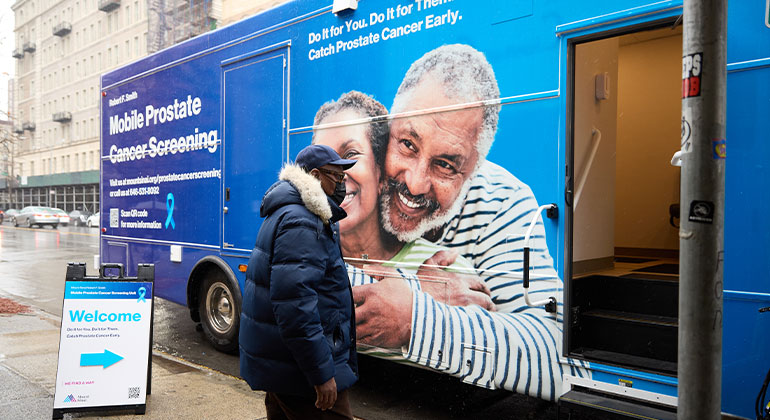
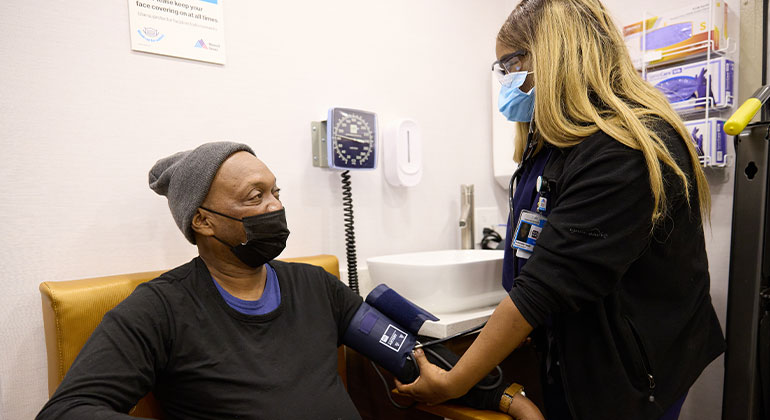
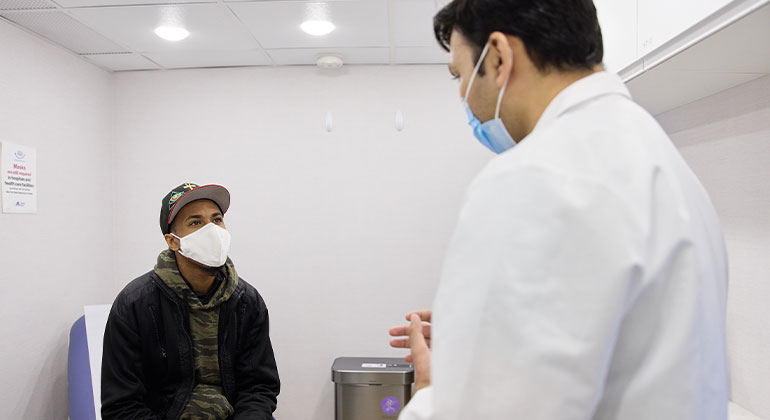
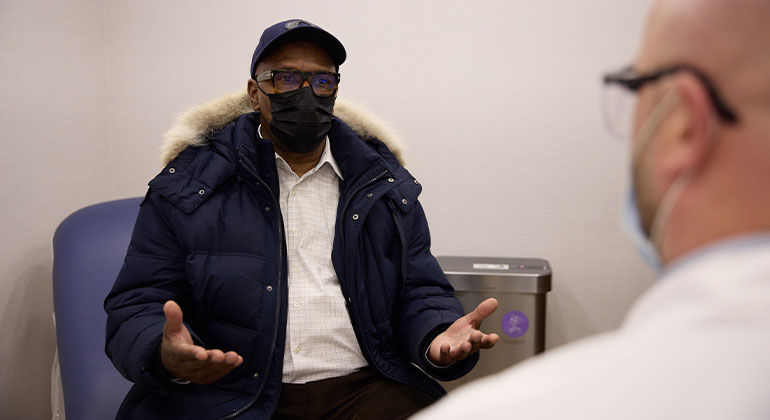
Mount Sinai Robert F. Smith Mobile Prostate Cancer Screening is committed to enabling early detection of prostate cancer for at-risk Black men. Made possible by a donation from Robert F. Smith, Founder, Chairman, and CEO of Vista Equity Partners, this mobile unit brings state-of-the-art imaging equipment and specialized staff directly to the communities that need them most.
What Is Prostate Cancer?
The prostate is a gland found between the bladder and penis. It produces a fluid that becomes part of semen, the reproductive fluid. Normally the size of a walnut, the prostate gland surrounds the urethra, which removes urine through the penis.
As men age, the cells in the prostate gland can become cancerous. More than 34,000 men die from prostate cancer in the United States every year.
However, with early detection, prostate cancer can be treated successfully.
Prostate Cancer Signs and Symptoms
Prostate cancer usually has no noticeable symptoms. The first sign of disease is often found during a routine screening exam. This is why screening is important.
The following symptoms may be caused by either prostate cancer or a benign (non-cancerous) enlarged prostate:
- Frequent urge to urinate
- Back pain
- Frequent urination at night
- Weak or interrupted urine flow
- Blood in urine and semen
- Inability to urinate/ painful urination/ strain on urination
Prevalence of Prostate Cancer
Prostate cancer is the second most common form of cancer in American men, right behind skin cancer. About one in eight American men will develop prostate cancer at some point in their lives, and about 1 in 40 American men will die of prostate cancer.
Black men have a 70 percent higher rate of developing high-risk prostate cancer, and they are also more than twice as likely to die of it.
Early Detection Saves Lives
Catching prostate cancer early is the best way to keep you healthy. All men above age 55 and all Black men above age 45 should consider screening for prostate cancer. The American Urological Association (AUA) recommends shared decision-making to weigh the benefits and risks of screening, and decisions should be individualized for men below 55 who are at higher risk.
Most men have a baseline prostate-specific antigen (PSA) test at age 55. This test also includes a digital rectal exam (DRE), during which a doctor uses a gloved hand to feel for any enlargement or abnormal area of the prostate.
Reaching an At-Risk Population
Under the direction of Ash Tewari, MD, the Center of Excellence for Prostate Cancer at The Mount Sinai Hospital has become one of the most widely respected and successful programs for diagnosing and treating prostate cancer.
The Mount Sinai Robert F. Smith Mobile Prostate Cancer Screening Unit is a state-of-the-art mobile facility, equipped with advanced scanning and trained staff.
Through community outreach, the program aims to:
- Raise awareness about the disease and services being offered by the mobile unit
- Set up prostate screening appointments at predominantly Black neighborhoods across New York City
- Schedule follow-up visits for patients with urologists at the Mount Sinai Center of Excellence for Prostate Cancer
Mount Sinai Brings Prostate Cancer Screenings to You
Mount Sinai is so committed to preventing prostate cancer that we’re taking state-of-the-art screenings straight to the communities who need them most. The Mount Sinai Robert F. Smith Mobile Prostate Cancer Screening Unit will bring diagnostic teams and tools directly to neighborhoods in central, eastern, and west Harlem; the Upper East Side; and Queens. In these areas, Mount Sinai experts expect that more than 13 percent of Black men between the ages 45 to 79 will have prostate cancer, and more than 1 percent of them die. That’s nearly 1,000 fathers, grandfathers, brothers, uncles, husbands, and sons who potentially can be saved by routine screenings.
Run by Mount Sinai’s Department of Urology, our mobile unit delivers a range of convenient services provided by compassionate experts in urology. The unit is equipped to conduct PSA, DRE, ExactVu™ ultrasound, bladder scanning, and genomics services.
Our goal is to lower prostate cancer deaths by 25 percent among Black males in the areas immediately surrounding The Mount Sinai Hospital and Mount Sinai Queens.
COVID-19 Precautions
Our program is committed to safeguarding the health and well-being of all patients and staff. To curb the spread of COVID-19, we are following a number of safety protocols, including:
- Requiring staff and patients to wear masks
- Disinfecting the exam area thoroughly between patients
- Following protocols to maintain social distancing while patients are completing registration forms
Funding by Robert F. Smith
Business leader and philanthropist Robert F. Smith is the man who helped make the mobile unit a reality. The vision for the mobile unit started with Ash Tewari, MD, MBBS, MCh, and his desire to address the disparity of prostate cancer occurrence in Black men and mitigate its rise. Dr. Tewari wrote to Mr. Smith, the founding director and President of Fund II Foundation, a nonprofit that makes grants to public charities, about the inequities he witnessed in his research and experience with patients. Inspired to help, Mr. Smith made a $3.8 million donation to the Mount Sinai Health System to create the screening unit.
Mr. Smith also formed a partnership with the Prostate Cancer Foundation to fund the creation of the Smith Polygenic Risk Test for Prostate Cancer, a blood- or saliva-based test that will determine an individual’s risk of developing prostate cancer in their lifetime.
Mr. Smith’s health equity work is not limited to his efforts around prostate cancer. Mr. Smith and Fund II Foundation partnered with Susan G. Komen for the Cure, a breast cancer organization, to fund the organization’s Health Equity Initiative, aimed at reducing breast cancer disparities in Black patients by 25 percent.
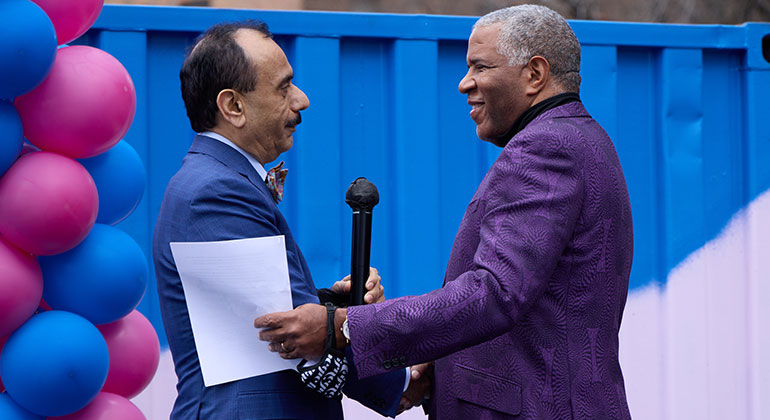
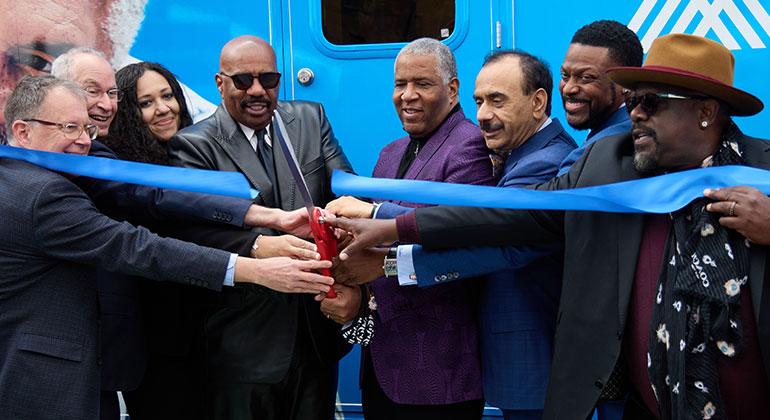
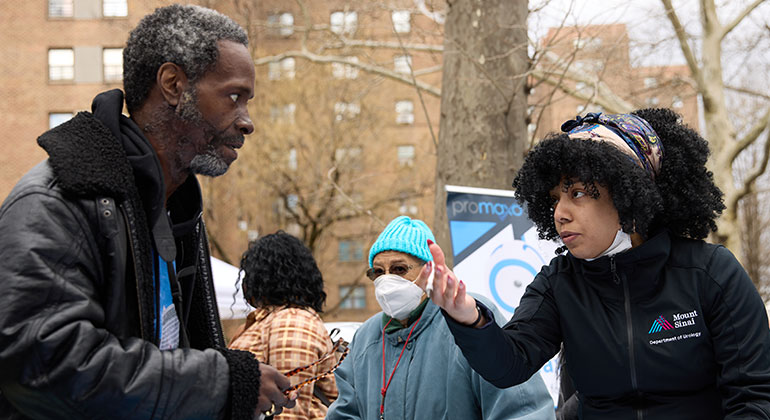
Our State-of-the-Art Prostate Cancer Treatments
Should you need additional care, Mount Sinai’s Center of Excellence for Prostate Cancer specializes in personalizing the right treatment plan for you. After further testing, our experts might determine that just monitoring your condition is best. If you have more advanced or aggressive prostate cancer, our specialists are skilled in the newest treatments available anywhere, including precision radiation therapy, advanced immunotherapy, hormone therapy, and chemotherapy. If you need surgery, Mount Sinai specialists have deep experience in robotic techniques that reduce pain and scarring and speed up your recovery time.
Throughout your care, our Urology Department’s Holistic Medicine, Nutrition, and Preventive Health Services will help you adopt good lifestyle habits and ensure you’re receiving the comprehensive care you need to lead a healthy life.
Meet the Team
Susan Marshall, MD
Assistant Professor
Department of Urology
Mani Menon, MD
Director, Education and Precision Prostatectomy Program
Icahn School of Medicine at Mount Sinai
Dhruti Patel, MD
Assistant Professor
Department of Urology
Avinash Reddy, MD
Assistant Professor
Department of Urology
Vinayak Wagaskar, MBBS
Clinical Instructor
Department of Urology
Gerald P. Hoke, MD, MPH
Associate Professor
Department of Urology
Norman H. Coleburn, MD
Instructor
Department of Urology
Kyrollis Attalla, MD
Assistant Clinical Professor
Department of Urology
Jay Motola, MD
Associate Professor
Department of Urology
Adriana Pedraza, MD
Fellow
Department of Urology
